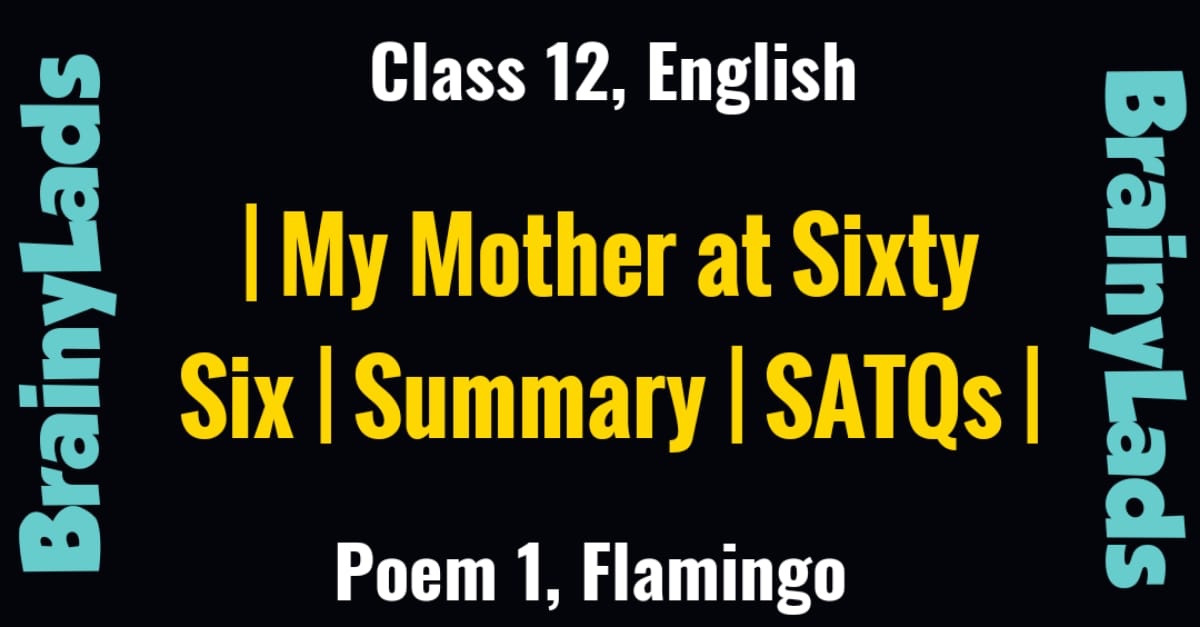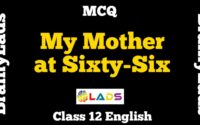Extracts of Poets and Pancakes | Chapter 6 | Flamingo | English |
Table of Contents
Extracts of Poets and Pancakes | Chapter 6 | Flamingo | English |
Extract 1
The make-up room had the look of a hair-cutting salon with lights at all angles around half a dozen large mirrors. They were all incandescent lights, so you can imagine the fiery misery of those subjected to make-up. The make-up department was first headed by a Bengali who became too big for a studio and left. He was succeeded by a Maharashtrian who was assisted by a Dharwar Kannadiga, an Andhra, a Madras Indian Christian, an Anglo-Burmese and the usual local Tamils. All this shows that there was a great deal of national integration long before A.I.R. and Doordarshan began broadcasting programmes on national integration.
a) Name the chapter.
1) Evans Tries an O Level
2) Memories of Childhood
3) Poets and Pancakes
4) Journey to the End of the Earth
b) What was the name of the studio?
1) Gemini Studios
2) Tauras Studios
3) Mars Studios
4) None of these
c) Who is the author of this chapter?
1) Asokamitrao
2) Asokamitrang
3) Asokamitran
4) None of these
d) Who had to bear a lot of misery in make-up room?
1) Those who were subjected to dance
2) Those who were subjected to make up
3) Those who were subjected to Painting
4) None of these
| a. Poets and Pancakes | b. Gemini Studios | c. Asokamitran | d. Those who were subjected to make up |
Extract 2
A strict hierarchy was maintained in the make-up department. The chief make-up man made the chief actors and actresses ugly, his senior assistant the ‘second’ hero and heroine, the junior assistant the main comedian, and so forth. The players who played the crowd were the responsibility of the office boy. (Even the make-up department of the Gemini Studio had an ‘office boy’!) On the days when there was a crowd shooting, you could see him mixing his paint in a giant vessel and slapping it on the crowd players. The idea was to close every pore on the surface of the face in the process of applying make-up. He wasn’t exactly a ‘boy’; he was in his early forties, having entered the studios years ago in the hope of becoming a star actor or a top screen writer, director or lyrics writer. He was a bit of a poet.
a) Whom did the office boy paint?
1) Actors
2) Actress
3) Both of them
4) None of them
b) What was the dream of office boy?
1) of becoming a star actor
2) of becoming a screen writer
3) of becoming a director
4) All of these
c) Find out the synonym of the word ‘Hierarchy’ from the following?
1) Order
2) Disorder
3) Mismanaged Group
4) None of these
d) Who was the Principal of Gemini Studios?
1) Subbu
2) SS Vasan
3) Asokamitran
4) Lawyer
| a. None of them | b. All of these | c. Order | d. SS Vasan |
We would love your reading of Formal Letters, Notice Writing, Formal & Informal Invitation, Classified Advertisement, Debate Writing, Speech Writing, Article Writing, Report Writing, Note Making, Poster Making, Short Story Writing, Leave Application Writing, Descriptive Paragraph Writing for scoring higher in upcoming examination.
Extract 3
Subbu was the No. 2 at Gemini Studios. He couldn’t have had a more encouraging opening in films than our grown-up make-up boy had. On the contrary he must have had to face more uncertain and difficult times, for when he began his career, there were no firmly established film producing companies or studios. Even in the matter of education, specially formal education, Subbu couldn’t have had an appreciable lead over our boy. But by virtue of being born a Brahmin a virtue, indeed! he must have had exposure to more affluent situations and people. He had the ability to look cheerful at all times even after having had a hand in a flop film. He always had work for somebody.
a) Why was Subbu considered No.2 at Gemini Studios?
1) Owing to his flattering of boss
2) Owing to his talent
3) Owing to his being Brahmin
4) All of these
b) Find out the antonym of the word ‘Affluent’ from the following?
1) Rich
2) Poor
3) Balanced
4) None of these
c) Which of the following adjectives suits Subbu?
1) Cheerful
2) Helping
3) Resourceful
4) All of these
d) Who was more talented than Subbu according to Asokamitran?
1) Lawyer
2) Office boy
3) Stephen Spender
4) MRA
| a. Owing to his talent | b. Poor | c. All of these | d. Office boy |
Extract 4
The lawyer was also officially known as the legal adviser, but everybody referred to him as the opposite. An extremely talented actress, who was also extremely temperamental, once blew over on the sets. While everyone stood stunned, the lawyer quietly switched on the recording equipment. When the actress paused for breath, the lawyer said to her, “One minute, please,” and played back the recording. There was nothing incriminating or unmentionably foul about the actress’s tirade against the producer. But when she heard her voice again through the sound equipment, she was struck dumb.
a) How was the lawyer referred at Gemini Studios.
1) Opposite
2) Professional
3) Legal
4) None of these
b) What happened to the actress on the set?
1) She started hugging others
2) She got happy after her voice was recorded
3) She got angry
4) None of these
c) Who recorded the actress’s voice?
1) Asokamitran
2) Subbu
3) Lawyer
4) None of these
d) What happened when the actress heard her voice again?
1) She got dumbstruck
2) She got speechless
3) She got shocked
4) All of these
| a. Opposite | b. She got angry | c. Lawyer | d. All of these |
Extract 5
They weren’t very good on the trapeze and their acquaintance with animals was only at the dinner table, but they presented two plays in a most professional manner. Their ‘Jotham Valley’ and ‘The Forgotten Factor’ ran several shows in Madras and along with the other citizens of the city, the Gemini family of six hundred saw the plays over and over again. The message of the plays were usually plain and simple homilies, but the sets and costumes were first-rate.
a) Who are ‘They’ in the first line?
1) MRA
2) Stephen Spender and followers
3) Staff of Gemini Studios
4) None of these
b) What was MRA famous for?
1) Their costumes
2) Messages of their plays
3) Theme of their plays
4) None of these
c) Which literary device has been used in ‘Forgotten Factor?
1) Simile
2) Alliteration
3) Personification
4) Epithet
d) What other names was MRA known by?
1) International School
2) International Circus
3) International World
4) None of these
| a. MRA | b. Their costumes | c. Alliteration | d. International Circus |
Extract 6
He couldn’t have addressed a more dazed and silent audience no one knew what he was talking about and his accent defeated any attempt to understand what he was saying. The whole thing lasted about an hour; then the poet left and we all dispersed in utter bafflement what are we doing? What is an English poet doing in a film studio which makes Tamil films for the simplest sort of people? People whose lives least afforded them the possibility of cultivating a taste for English poetry? The poet looked pretty baffled too, for he too must have felt the sheer incongruity of his talk about the thrills and travails of an English poet. His visit remained an unexplained mystery.
a) Who is ‘He’ in the first line?
1) S S Vasan
2) Subbu
3) Stephen Spender
4) MRA
b) Why could no one understand Stephen Spender?
1) Owing to his accent
2) Owing to his english
3) Owing to language barriers
4) All of these
c) What does the word ‘Baffled’ mean?
1) Perplexed
2) Confused
3) Mazed
4) All of these
d) Who has been referred to poet in the above lines?
1) S S Vasan
2) Subbu
3) Stephen Spender
4) MRA
| a. Stephen Spender | b. All of these | c. All of these | d. Stephen Spender |
Extract 7
On the footpath in front of the Madras Mount Road Post Office, there was a pile of brand new books for fifty paise each. Actually they were copies of the same book, an elegant paperback of American origin. ‘Special low-priced student edition, in connection with the 50th Anniversary of the Russian Revolution’, I paid fifty paise and picked up a copy of the book, The God That Failed. Six eminent men of letters in six separate essays described ‘their journeys into Communism and their disillusioned return’
a) Which book did Asokamitran buy?
1) The God that passed
2) The God that Failed
3) The God that won
4) None of these
b) How many essays were there in The God That Failed?
1) Four
2) Five
3) Six
4) Seven
c) Who was one of the essayists from the following?
1) William Saroyan
2) Nizzim Ezekiel
3) Asokamitran
4) None of these
d) What was The God That Failed all about?
1) Essayists journeys into Communism and their illusioned return
2) Essayists journeys into Communism and their disillusioned stay
3) Essayists journeys into Communism and their disillusioned return
4) None of these
| a. The God that Failed | b. Six | c. None of these | d. Essayists journeys into Communism and their disillusioned return |
Related
Do share the post if you liked it. For more updates, keep logging on BrainyLads


